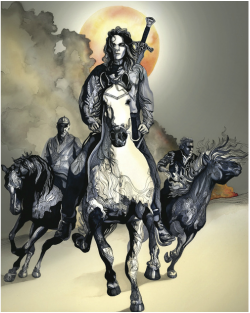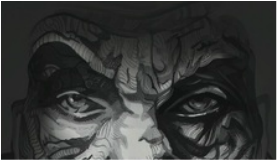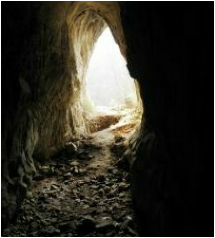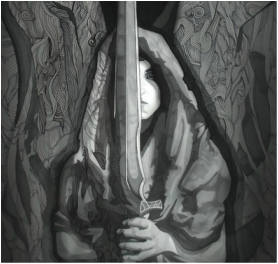 As a writer I believe the importance of story is not simply to entertain, and not simply to grow the imagination. While both of these are in fact the driving demand for fiction and the second is hugely important in a well-rounded human being, if the effect of a story ends there, something is missing. A story and its characters should develop in such a way that they challenge the reader to consider matters of great importance, specifically, ethics and morality. As a Christian I believe that the importance of Story in sharing the Christian faith is near and dear to the heart of God. I believe this for two main reasons: (1) All of Scripture is a story of the Love of God, culminating in the Good News and (2) Jesus himself often used parables to teach, which were in essence, stories. It is a human term to use in describing the Infinite One, but God is the ultimate Storyteller. God is the author of the greatest epic ever told. It includes the Creation, Eden, the Fall, the Flood, the Exodus, the establishment of the nation of Israel, the Temple, the Judges, the cyclical rise and fall of Israel’s Kings, the Dispersion, and all throughout it the Prophets and their message of how God was planning to redeem Adam's race once and for all. He promised, and He would deliver a Messiah – a Champion. This is why The Reaper’s Seed is an allegorical epic fantasy, as I like to call it. It is inspired by what has inspired my faith in God - His plan of Salvation for Adam's race. My own fascination with God's writing is one of the reasons - from among many - that I am such a huge fan of C.S. Lewis. I share his awe for the story of God's plan of Salvation for Mankind. The first of his works that I read was of course the Chronicles of Narnia. Even then, as a child, I knew that these books were an allegory of many of the aspects of the greatest epic, God's Story. The Chronicles of Narnia still entertain me, strengthen my imagination, and bring me to consider matters of ethics and morality. Even better, they've fed me soul. This is my goal, and remains my goal for The Reaper's Seed. I've sought to infuse this story with meaning, enough of it that it will feed the reader's soul. Either way, I can't rightly try for less with a literary hero like C.S. Lewis.  Many miles west of Wellman, through the northern regions of the Bryn Mountains, beyond the Plains of Shole, lay the city of Shole itself. The largest of all the cities in the Lowlands, it was also the oldest, built by Homsoloc and his sons. Placed on an immense plateau, it overlooked the region around it for miles in all directions. It was a fortified city, originally built for the sole purpose of defense. Made of stone at its center, it had withstood sieges, fires, and the fiercest weather the Lowlands had ever seen. The rock wall that surrounded the city limits, standing four feet high, had witnessed it all. The architecture of Shole was like that of a large puzzle, as if its builders had more than once considered it incomplete. But with each passing decade it had grown larger, its citizens adding yet another section, slowly filling the plateau. Settlers now also inhabited the region surrounding its soft slopes to the north and the east. Still further west, on the opposite side of an expansive valley of wooded terrain stood the Black Mountain. It rose into the sky like a scar on the landscape. Once a flourishing wilderness, the woods immediately surrounding the mountain were now dead and colorless, like a pile of ashes in the midst of a healthy green field. The very mountain itself had died and hardened. On its peak and along its slopes lay the twisted forms of trees, like men left dead on a battlefield. At the foot of the Black Mountain there stood a large gate, a lattice of long, sharp spears. For hundreds of years it had remained unchanged, maintaining the dark color of the ore from which it had been forged. Joining together an arching stone wall that ran to the north and south, the gate faced the city of Shole like bared teeth. The wall, standing ten feet tall and five feet thick, curved back toward the Black Mountain in the shape of a crescent, forming a large courtyard of dust, gravel and rock. On the other end of the courtyard was a pair of guards, each armed with a large battle-axe, standing watch at the entrance of an enormous cave. They were soldiers of Mornoc set apart for their size and strength to be the guardians of the Black Mountain. They wore no helmet but had full heads of thick black hair pulled back from their eyes and tied behind their heads. A fierce, but stolid expression was written on their faces. The chain mail shirts they wore were impenetrable, heavier and thicker than any known to man. Even so, they seemed more ceremonial than anything, as these soldiers were not likely to lose a fight hand to hand. The cave itself had a roughly hewn entrance, but the floor of it cut deep into the heart of the mountain like a well-worn road. Once the mouth of the cave and the light of day were lost from sight, pairs of torches were set in either side of the cave wall at intervals. Despite these lights to lead the way, it was an unearthly, suffocated place. Like the main road to a hidden city, smaller tunnels branched off of it, leading to the far recesses of the mountain. Some of these passages were watched by an armed guard while others were merely marked by a lantern. As the tunnel continued, in time, it gave way to several sets of stairs carved into the floor, leading to higher ground. At the top of these stairs the cave walls opened up into a great hall and the ceiling doubled its height. In this hall, an elaborate array of torches lined the inside of ten massive columns carved from the walls, five to the right and five to the left. On the opposite side of each column hung another lamp lighting the face of the walls and the entrances to yet more tunnels, running to more rooms within the mountain. In the center of the hall, three monstrous chandeliers hung from the ceiling, lighting the way to the far end. There, with a king’s court all to himself, Mornoc, the father of rebellion and pride, sat on his throne. Positioned against the far wall, facing east, it was cut from the stone floor. Its arms yielded to the shape of his grip and its seat and back to the posture of his body. The right arm of this throne was carved in the shape of a large hand, clenched in a fist. Resting in its grip was Mornoc’s spear, over ten feet long and razor sharp. The fine garments that would normally have adorned such a magnificent throne were instead carved into it; no ornament of cloth, gold, or jewel was present. Without a single crack or fissure, it displayed such decorations in its surface and structure. But it was colorless. Mornoc himself wore robes in shades of gray and black. Even his skin color was a dingy gray, and his bald head did not shine in the glow of the lamps. His face was worn, lined by centuries past, wrinkled by bitterness and a desire for revenge. His eyes were gray, cold, and piercing. Staring at the other end of the hall and drumming his fingers on the arm of his throne, Mornoc wore a smug smile. His dirty nails clicked loudly in a slow and ominous rhythm. It was not joy or happiness that moved the corners of his mouth, but expectant malice. Content to remain silent in his hall, he was waiting, patiently waiting. “One day soon. One day soon . . .” Mornoc whispered to himself. “I will have mine.” With these words he jumped down from his throne and began to pace back and forth. With both arms held behind him, his robes flowed loosely, barely touching the floor. Turning sharply at the base of one column, he headed back toward the other with a measured pace, following a clear path he had worn into the stone floor. And every time he turned he would look toward the entrance. The guards stationed there remained at attention, not daring to observe the movements of their lord. Pausing, he brought a hand to his chin. Staring into the thin air in front of him, he muttered under his breath, “I will have mine.” He did not look upon the splendor of his hall or the size of the chandeliers above. His eyes were peeled on the one thing he had failed to attain so long ago. “I will have my own name, my own kingdom, my own . . .” His thoughts trailed off once again to a place he could not go. Scowling, he released his chin and clenched his fist. “I will have mine!” he said in a deep, suppressed yell. His words pulsed off of the rock walls. With a huff he returned to sitting on his throne and staring at the entrance to his hall. Get The Reaper's Seed: The Sword and the Promise at Amazon in Kindle or Paperback.  Several miles south of Oak Knoll, a lone traveler ran through the woods carrying a lantern. The glass bowl covering the wick was blackened at the top from the night before. His dress was black and on his back was a pouch full of short spears. Moving swiftly, he made his way along a subtle trail, through thick woods at the base of a rocky hill. His gaunt face betrayed some of its youthfulness, but it spoke also of an unnatural strain. He followed the trail to the lowest point of the woods and there entered a cave. In the entrance he lit the lantern he’d been carrying with one that hung from the cave wall. Crouching slightly, he followed the cave into the heart of the hill. At thirty yards, the tunnel gradually began to open up, heading into the earth. As he continued, the jagged walls began to grow moist and the air grew warmer. In sections there was a steady trickle of water along the floor at the base of the walls. Deeper and deeper he went, leaving the sun behind. Taking one last turn, he hung his lantern on a nail in the rock, the beginning of a long row of lanterns of all shapes and sizes. From there he followed the lights to a place where the cave opened up into a large chamber. In the middle of the cave a long stone table was lined with men of a similar dress, feasting. It was an underground banquet hall lacking all of the fineries expected at a banquet. The square room was well lit by a massive candle chandelier that hung above the table and several lanterns that hung at each doorway and along the walls. The air was filled with the smell of meat, ale, and burning oil. At each of four entrances, one on each side, a guard stood at attention. Above one of these doors, etched in stone, was the name “Casimir.” Ignoring the guards, the returning scout walked up to the table and joined the feasting. Every man at the table wore a pouch of short spears on his back, black clothing, and had dark hair and eyes. The only things that set them apart were their facial features, length of hair, and height. They were all thin and haggard, like men near death, but there was an apparent ferocity about them all. The scout took his place at an empty spot on one of the wooden benches and immediately tore into the first piece of meat within reach. All of the meat was in the form of whole carcasses, just cooked, but quite rare. Lining the table were pitchers of cold ale, earthen cups, and tin plates. The sounds of feasting permeated the atmosphere. “Did you bring his lantern, Selcor?” a scout asked the new arrival in a guttural voice. “Yes,” Selcor replied over a mouthful of meat. They both focused on their food for a minute or so longer before Selcor added, “I made him bleed, but he escaped.” His companion paused to contemplate the words then washed down his food with some ale. His bushy hair hung over his forehead in wavy strands. Wiping his face with his sleeve, he opened his mouth to speak again, but was cut off. “Hail, your Mallith!” A voice cried from the other end of the table. The command echoed loudly through the chamber, ringing into the tunnels. All in attendance rose to their feet on the outside of their benches and turned to face the entrance at the far end of the table, the one with the name “Casimir” carved above it. Some spit food out of their mouths onto their plates, or swallowed what was left to more quickly assume a position of attention. Once there was complete silence and every one of them was on their feet, a great gangly figure walked through the stone doorway and paused just under the light of the lanterns to his left and right. A black robe covered the form of a man no less than eight feet tall. He stood slightly bent over but with square shoulders. In his right hand he carried a long club with a heavy metal sphere on the end, adorned with five large spikes. His long black hair was lined with thick strands of gray and his beard was kept short, appearing just as dark against his pale skin. There were scars on his cheeks running down from his eyes like tears, and his hands and forearms were scarred in a similar manner, as if burned. Like all of those present, he too carried a pouch of spears on his back. There was an uncomfortable moment of silence. The giant slowly extended his right arm, holding the club out in front of him. In unison all of the men at the table pulled a spear from their pouches, saluting him with the point of their weapons. “Casimir!” they all bellowed in one voice. Get The Reaper's Seed: The Sword and the Promise at Amazon now.  A waning moon, dimmed by thinning clouds, cast its faint glow on the wooded landscape below. The leaves of the trees were once again falling, coloring the forest floor in shades of orange, red, and brown, permeating the air with their scent. The changing temperatures gave rise to a mist from the earth’s warm surface that hung suspended, still as stone. The crack of a stick was as good as a shout. Through such a scene a young man swiftly made his way on foot along a well-used path. His steps were sure and he traveled the path with a seeming knowledge of every twist, dip and turn to the very texture of its surface. Steadying the sword at his side with his left hand, Corred swung the other to match his gate. Little could be heard of his travel apart from the sound of his breathing and the occasional crunch of leaves. The color of his clothes matched the season in drab shades of brown and olive. The hood of his shirt hung loosely, allowing for better vision. His dark brown hair fell to his shoulders, and though his features were not distinguishable in the dark, the length of his stride spoke of his youthful strength. And though he traveled without a companion, Corred was not alone. From a higher point in the woods, against a thicket, a silent figure bent low to the ground to hide his outline. He was carefully watching Corred’s path. His dress was black, matching dark eyes and on his back hung a pouch full of short spears. His hair was just as dark except for a few blond tips still clinging to black roots. Crouched motionless, he looked ahead, seeking a point of ambush. Once located, he quickly turned back into the thicket to carry out his attack. As Corred made a turn in the path, he heard the snapping of a twig in the distance. His attention was drawn to the hill on his left, but there was no motion to accompany the sound. His pulse quickened and his senses grew more alert with each step. Moving with the agility of a predator, the dark figure exited the opposite side of the thicket and stood behind a tree to wait. As he slowly raised his hand to the pouch on his back, his long fingers felt one of the spears, and stayed there. For a brief moment the light of the moon revealed the hunter’s features: hollow eyes, gaunt cheeks, and a sinister glare. His wide, black eyes absorbed all of the light available, shifting to and fro in search of his quarry. He walked his grip down the shaft of the spear when he heard the crunch of leaves to his right. Several seconds passed. Then, from his periphery, he spotted Corred running through the brush fifty yards out of range. Cursing behind clenched teeth, the hunter flew down the hill and pursued his target along the very path he had been watching. The spear was now in his hand, held at shoulder height, ready for release. His pursuer now flushed from hiding, Corred fully realized the source of his alarm. Pulling his sword, he hit the full length of his stride. Fear threatened to take over, but he fought the panic and searched for a possible advantage. Ducking under the lower branches of an evergreen, Corred picked up a rock in his left hand. As the gap between he and his attacker lessened, Corred gripped his sword all the tighter. In the darkest part of the woods, he stopped on the face of a leaf. Rolling the stone ahead of him, he slipped behind a tree. The hunter quickly released his spear in the direction of the sound, burying it in the stump of a fallen tree. Slowing to a standstill, he listened quietly while pulling a second spear from his pouch. After a moment of silence, he backtracked toward the place he had last seen his prey, stepping lightly. A low, angry growl escaped his throat. Every muscle tensed and ready, Corred waited for the opportune time to either attack, or run. As the burning in his chest subsided, and he began to catch his breath, he listened carefully for his enemy’s movements. A minute passed before he again heard the crunch of leaves. At the snapping of a twig, now further away, he drew a deep breath and took off at a full sprint, aiming for the main path out of the woods. Within a few steps another spear flew just behind him, skipping across the forest floor. Pushing so hard that he barely touched the ground, the hunter attempted once more to catch his prey. But this time, the intensity of his pursuit seemed to be well matched by his target’s flight. Unable to keep pace, the hunter hurled a second spear down the path with the full force of his body behind it. It found its mark. Get "The Reaper's Seed: The Sword and the Promise" at Amazon now, in Kindle or Paperback. |
Archives
February 2020
Categories |
